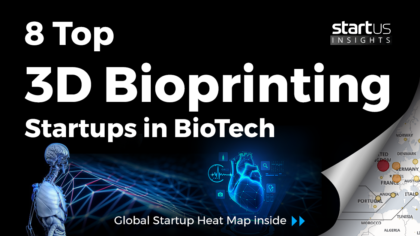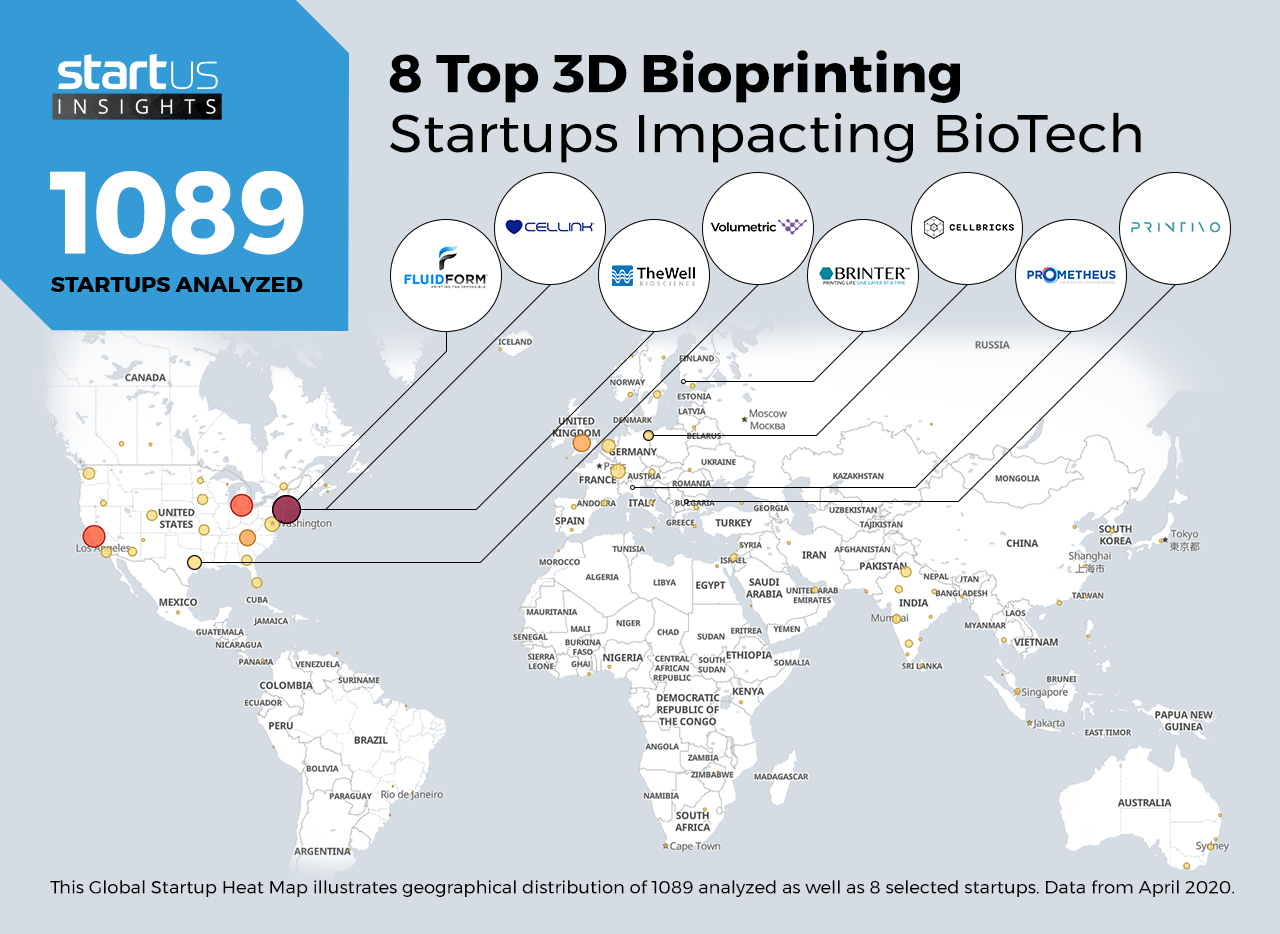Accelerate Productivity in 2025
Reignite Growth Despite the Global Slowdown
Our Innovation Analysts recently looked into emerging technologies and up-and-coming startups working on solutions for the biotechnology sector. As there is a large number of startups working on a wide variety of solutions, we want to share our insights with you. This time, we are taking a look at 8 promising 3D bioprinting startups.
Heat Map: 8 Top 3D Bioprinting Startups
For our 8 top picks, we used a data-driven startup scouting approach to identify the most relevant solutions globally. The Global Startup Heat Map below highlights 8 interesting examples out of 1.089 relevant solutions. Depending on your specific needs, your top picks might look entirely different.
TheWell Bioscience – Bioinks
Bioinks are the base materials used in 3D bioprinting. These include materials that allow cells to develop and grow or materials that carry the cells to form tissues. Startups and emerging companies are working on bioprinting solutions in order to reduce dependency on organ donations while making it easier, and cheaper, to print human tissues and other living parts.
The US-based startup TheWell Bioscience develops bioinks for 3D printing. Their solution VitroINK is an innovative bioink system that prints without ultraviolet (UV), heat curing, or chemical cross-linking. This bioink is stable at room temperature, and the cells are pre-mixed in the hydrogel or directly mixed with the bioink, by employing a dual syringe system. The startup incorporates multiple biological functional components for different bioprinting applications.
Volumetric – Bioprinting Materials & Reagents
Biofabrication usually covers the production or printing of complex biological products from raw materials, such as living cells, matrices, biomaterials, and molecules. While it is possible to print living cells, the materials used in the process lack the structural stability and functioning that is required from the printed cells. Startups are working to create innovative bioprinting materials for enabling the stable printing of living human organs.
Volumetric, a startup from the United States, works on advanced bio-fabrication solutions with high-quality materials and systems for 3D bioprinting. Some of the startup’s bioprinting materials and reagents include Lithium phenyl-2,4,6-trimethyl-benzoyl phosphinate (LAP) Photoinitiator, carbohydrate glass, and polyethylene glycol.
Cellinks – Customizable Bioink Kits
Bioprinting enables various applications in making functional constructs to replace injured or diseased tissues with scalable reproducibility. The use of suitable bioinks enables printing in an automated manner, opening the door for high-throughput tissue or organ production. Further, startups make it easier to choose the most suitable bioinks by offering ready-to-use kits that include the required biomaterial for creating skin or organ tissues.
The US-based startup Cellink Global builds patent-pending bioink made of a biomaterial that enables cells to grow and thrive as they would in their natural environment. Cellink Global manufactures a universal bioink that is compatible with any cell type and with any 3D bioprinting system. The company’s bioinks combine the advantages of shear-thinning nano-fibrillar cellulose and the versatility of alginate. Moreover, the startup offers a set of bioink kits that are designed for specific purposes.
Prometheus – Second Skin For Wounded Animals
Human beings are not the only organisms that benefit from bioprinting. Animals often get injured as well, and not enough research is being conducted to improve medical treatments for this target group. Startups and emerging companies are working on solutions that cater to different skin types and biological functions that occur in animals.
Italian startup Prometheus develops Ematik Ready, personalized medicine for the treatment of animal wounds. The startup creates a second skin patch for wounded dogs and horses that cuts the healing time in half. To achieve this, Prometheus collects blood from the injured animal, analyzes skin growth factors, and later uses microbial biopolymers that support active molecules to treat wounds.
BRINTER – Rapid Prototyping Bioprinter
According to the World Health Organization (WHO), every year, more than 100,000 organ transplantations are performed worldwide. The assigning and operating of donors and recipients disproportionately affects poor people along with those without connections in organ banks or medical practitioners. In order to give anyone the chance to save a loved one, startups are working on various additive bioprinting techniques that make the processes cheaper and more accessible.
Finnish startup Brinter works on its eponymous modular bioprinter that employs rapid prototyping technology. The startup uses a cell-laden hydrogel solution as bioink and load into their 3D printer, Brinter. The inherent Duet3D software reads the source file and Brinter prints the tissue models layer by layer. These constructs are later physically cross-linked with other chemicals ensuring structural integrity. Moreover, the startup develops personalized cancer medication by printing models of patient-specific tumors and later testing potential drugs for medication.
FluidForm – Freeform Reversible Embedding Bioprinter
In contrast to additive manufacturing used in industrial applications, 3D bioprinting requires an even higher degree of flexibility. Tissues and cell-cultures transform into models that are important for drug testing and diagnosis. Consequently, startups and emerging companies develop solutions that address the challenges facing existing 3D bioprinting techniques.
FluidForm is a US-based startup building customized 3D bioprinting solutions using its Fresh printing technique. This enables the startup to print soft materials and eliminates the need for printing support links or ink modifiers that usually delay the printing process. FluidForm’s Lifesupport printer first prints the construct, then cures it using preset methods, and later melts the support gel away, and remains with an end-product.
Cellbricks – Stereolithography-Based Bioprinter
Stereolithography uses photochemical processes to 3D print a wide range of industrial components, as well as bioprinting applications. Printing micro organs and selecting the correct bioinks pose as major challenges to 3D bioprinting. In addition, conventional methods of stereolithography-based bioprinting often use UV light, which potentially damages the created cells. Novel stereolithography techniques aim at addressing these challenges.
German startup Cellbricks creates complex biological cell culture systems by applying proprietary stereolithography-based bioprinting techniques. The startup simultaneously uses multiple bioinks to print mechanically integrated objects. Cellbrick’s technology helps realize the vision for creating viable synthetic organs and, additionally, the company offers bioinks, 3D bioprinting hardware, tools, as well as the services that make it possible.
Printivo – Pneumatic Extrusion-Based Bioprinter
Compared to traditional scaffold fabrication techniques, especially for bioprinting, pneumatic extrusion-based methods offer quicker turnaround and cheaper equipment requirements for researchers. As a result, startups and emerging companies look to develop suitable bioinks that are compatible with feasible 3D bioprinting. This opens the door for printing a wide variety of bio-objects including bone, cartilage, and tissue.
Printivo is a Bulgarian startup designing 3D human bone tissue for the purposes of in-vitro efficacy and toxicity assays. The startup provides pharmaceutical companies with a bone tissue graft, on-demand, and later use it for drug testing in preclinical trials. Using proprietary multipotent bioink formulas (ADAM) and bioprinter (EVE), Printivo develops tissue constructs and stem cells. In addition, the company intends to 3D print bone and heart using their technology.
What About The Other 1.081 Solutions?
While we believe data is key to creating insights it can be easy to be overwhelmed by it. Our ambition is to create a comprehensive overview and provide actionable innovation intelligence for your Proof of Concept (PoC), partnership, or investment targets. The 8 startups showcased above are promising examples out of 1.089 we analyzed for this article. To identify the most relevant solutions based on your specific criteria and collaboration strategy, get in touch.








